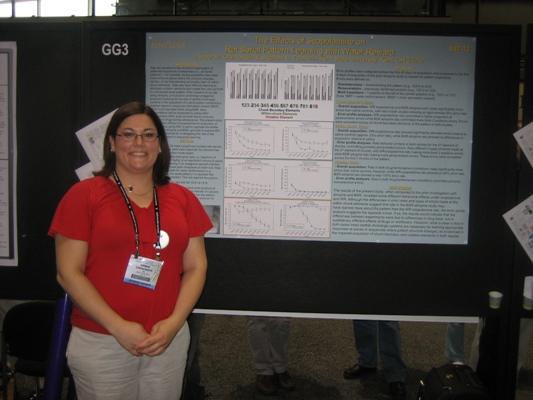|
Poster Abstracts:

The effects of scopolamine on rat serial pattern
learning with water reward.
PDF
A.M. Chenoweth and S.B. Fountain, Department of
Psychology, Kent State University, Kent, OH 44242.
Rats are sensitive to the structural organization
of patterned sequences of responses (i.e., of "serial patterns"). For
example, during acquisition rats make more errors at places where the
structure changes, namely, on the first elements of chunks, than on
within-chunk elements. Rats also have difficulty learning to anticipate
violation elements that violate the rules set forth in a structured
serial pattern. Prior research in our lab using atropine, a muscarinic
cholinergic antagonist, produced evidence for the role of central
cholinergic systems in the acquisition of a serial pattern containing a
violation element using brain stimulation reward (BSR). The present
study examined the effects of scopolamine on acquisition of serial
patterns using water reinforcement. Rats were given daily i.p.
injections of scopolamine (0.6 mg/kg) 30 min prior to training in an
octagonal operant chamber equipped with a nose poke receptacle on each
wall. Rats learned to nose poke for water reinforcement in a particular
order (the serial pattern) in a discrete-trial procedure with
correction. The rats learned the pattern: 123 234 345 456 567 678 781
818, where the digits represent the clock-wise positions of receptacles
in the chamber, spaces indicate 3-s pauses, other intertrial intervals
were 1 s, and the last pattern element violated pattern structure. Rats
received 10 patterns a day throughout acquisition. Central cholinergic
blockade by scopolamine caused profound impairments in acquisition for
chunk boundary elements (the first element of chunks) and the violation
element of the pattern, but did not affect acquisition for within-chunk
elements. Although other studies sometimes show different behavioral
effects of scopolamine with water reinforcement versus other reinforcers,
our results with water reinforcement paralleled those observed earlier
with BSR. The results reinforce our earlier claims that intact central
cholinergic systems are necessary for learning appropriate responses at
places in sequences where pattern structure changes. Further, the
differential impairment of element types suggests that multiple neural
processes are likely involved in sequential learning.
|